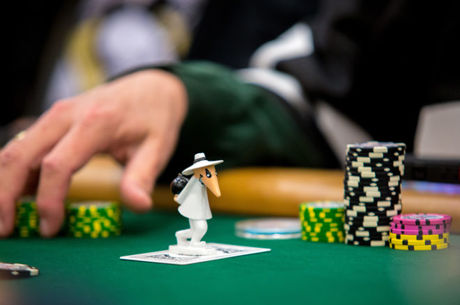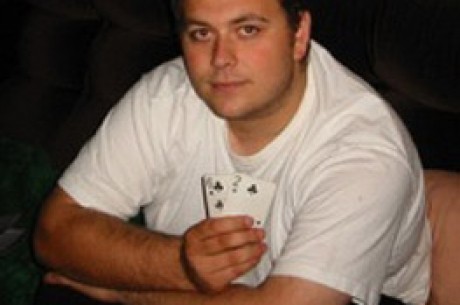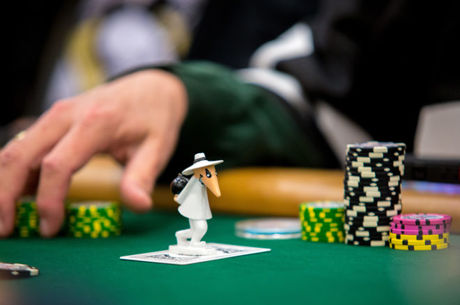Saving bets on the river (1): nothing to gain, everything to loose

Saving river bets should be a very important aspect of your game plan. This is because the river is a 'big bet' (twice the size of the pre-flop and flop bets) and it is important to lose as little as possible when you are behind. There are several pieces of advice I can give you about saving bets on the river. In this article, I want to discuss the situations where you should not bet on the river because you have nothing to gain and everything to lose. When these situations arise, a free showdown, a check and call or a check and fold, is the superior strategy.
Let me give you an example. You have Ac-Qc and raise preflop in an early position. You are cold called by two opponents. The flop comes Ah-10s-9h. You bet and both opponents call. The turn is a Kd. You bet and both call again. The river is a 10h. In my opinion, this is a situation where a bet on the river has nothing to gain and everything to lose. Here are the possible outcomes on the river:
1) One of my opponents was on a straight draw and completed the draw on the turn.
2) One of my opponents was on a flush draw and completed the draw on the river.
3) One of my opponents was calling with middle pair on the flop/turn and improve to trips on the river.
4) One of my opponents has an ace with a poorer kicker and improved to aces up with a king kicker on the river, in which case, we split the pot.
5) Both opponents have been calling me on the flop and turn with the second best hand and the river did not improve their hands.
If possibilities 1, 2 or 3 occur, I will lose the pot. If possibility 4 occurs, I will split the pot. If possibility 5 occurs, I will win the pot.
If possibility 5 occurs and I bet the river, I believe there is a reasonable chance that neither of my opponents would have called. Keep in mind that if the turn and river didn't help them, it probably scared them out of calling your bet. Occasionally a loose player may call, but these occasions are rare against standard opponents. Overall, a bet on the river when possibility 5 occurs will not show much profitability.
If possibility 4 occurs, my bet on the river shows no profitability as I will be called by an opponent holding an ace and we will split the pot.
If possibilities 1, 2 or 3 occur, a better on the river will have negative long term expectation, as it is unlikely that an opponent would throw away a better hand than mine if I bet on the river.
So in the final analysis, I have virtually nothing to gain and everything to lose in a bet on the river in this sort of situation. A large percentage of the time, I will split or lose the pot. Looking at the long term, a bet on the river therefore has negative long term expectation. As such, you should not bet. Check and fold or check and call instead (whichever you think is correct).
I think my now that you should get point. I wish to finish with two further examples of when a bet on the river has nothing to gain and everything to lose.
When a completed draw may have been outdrawn on the river
You have 7-8. The board to the turn is 6-8-9-10. You bet two opponents call. The river is a Jack. Now this is not necessarily a bad card for you. However, you must consider that the board looks extremely dangerous to an opponent who doesn't have a straight. So if you bet on the river here, your opponent is only going to be inclined to call you with nothing less than an eight. However, one opponent may have outdrawn you. In either case, the bet on the river shows no long term expectation so it is better not to bet - everything to lose, nothing to gain!
Here is another one. I have Qs-10s and the board it 9s-7s-3d-Js-6s. On the river, if you bet, you are going to be called by the king of spades or raised by the ace of spades. I doubt whether a player holding an 8 of spades would consider calling you on the river. If your opponents do not have a flush, they are very unlikely to call you. Thus, your bet has nothing to gain and everything to lose.
When a bluff appears to have failed
I think that this requires extreme discipline. Most players can't help themselves in this situation. Let's say you have A-10 and the flop comes J-9-7. It's checked to you and you bet. Two opponents call. The turn is J. Again it is checked to you and you bet. Both opponents call. The river is queen. Many players who have been bluffing the whole way believe that they are 'forced' to bluff at this on the river because they have been representing a jack. Alternatively, they think that they may be able to represent a queen by betting on the river. But a bluff on the river has virtually no chance of success here and if you are called, your opponent will be able to beat you. If you win that hand with ace high, your opponent probably wouldn't have called if you bet the river. If an opponent had a 7 or have been loose calling with a hand like 5-5, more often than not, they will call one final river bet with resignation, just in case.








